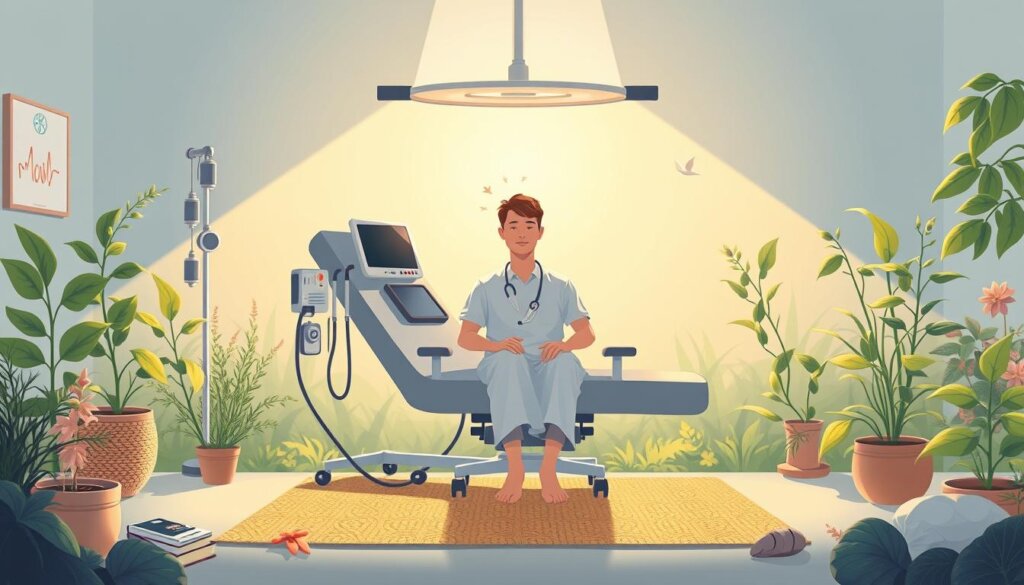FTC disclaimer: This post may contains affiliate links and we will be compensated if you click on a link and make a purchase.
In Australia, a study found many people use complementary medicine. Around the world, more people are looking into alternative and complementary therapies. They want to handle their symptoms and feel better. These therapies are used alongside traditional treatments.
This article will look into different cancer treatments. We’ll talk about the good and bad sides of these options. You’ll learn how to choose the best treatments for you.
Key Takeaways
- Complementary and alternative therapies are increasingly popular among cancer patients worldwide.
- These therapies can help manage symptoms and side effects and enhance overall well-being during cancer treatment.
- It’s important to separate effective, evidence-based approaches from unproven or potentially dangerous alternatives.
- Integrating alternative therapies with conventional cancer treatment requires close communication with your healthcare team.
- Understanding the risks and benefits of alternative therapies is crucial for making informed decisions about your cancer care.
Understanding Alternative and Complementary Therapies
Definitions and Distinctions
When you’re dealing with cancer, knowing the difference between alternative and complementary therapies is key. Alternative treatments are not part of the usual cancer plan. On the other hand, complementary therapies help manage symptoms and side effects while you get standard treatments.
Integrative oncology blends standard cancer treatments with safe, effective complementary therapies. It considers what you prefer and looks at your mental, physical, and spiritual health.
Conventional medicine uses doctors to treat symptoms with drugs, radiation, or surgery. Complementary medicine is used with standard care. Alternative medicine is used instead of standard treatment.
CAM therapies help with side effects, comfort, and stress. They also aim to treat or cure cancer. These include vitamins, herbs, meditation, and yoga.
CAM includes massage, chiropractic, and reflexology. Energy healing, like reiki, tries to balance body energy. Whole medical systems like Ayurvedic and Traditional Chinese medicine offer holistic views from different cultures.
Knowing these terms helps you make better choices for your cancer care. Always talk to your healthcare team about any therapies you’re considering. This ensures they’re safe and won’t harm your standard treatment.
Benefits of Alternative and Complementary Therapies
Alternative and complementary therapies can help people with cancer a lot. They don’t cure cancer, but they can make life better. These therapies can ease side effects like nausea and pain.
They also help with stress, improve sleep, and make life feel better overall. Taking a holistic approach to cancer care can improve how patients feel physically and emotionally.
Many cancer patients use these therapies. Around half of them try something new to feel better. They find comfort in the support they get from therapists.
Some therapies, like acupuncture, really help with symptoms and treatment side effects. Having a positive outlook is key, and these therapies can help with that.
But, some therapies claim to cure cancer, and there’s not much science to back that up. Always talk to a doctor before trying new therapies.

In short, alternative and complementary therapies are very helpful for cancer patients. They help with the physical, emotional, and mental sides of cancer. But, it’s important to work with doctors to make sure these therapies are safe and work well with treatment plans.
Popular Alternative Therapy for Cancer Options
When you get a cancer diagnosis, many look into alternative and complementary therapies. These Alternative Cancer Treatments List can help with symptoms and side effects. Some top choices include:
- Mind-Body Therapies for Cancer, like acupuncture, may ease side effects, says the National Cancer Institute
- Aromatherapy with Essential Oils, therapy for cancer patients, as listed by the National Cancer Institute
- Relaxation techniques like meditation, yoga, and tai chi to manage stress and improve well-being
- Energy Healing for Cancer methods like Reiki and Qigong aim to balance energy flow
- Music therapy to lessen anxiety and pain and boost mood and life quality for cancer patients
Remember, not all Natural Cancer Remedies work for everyone. Always talk to your healthcare team before trying any new therapies. The FDA warns against fake products claiming to cure cancer, so it’s key to find trustworthy info online. The American Cancer Society suggests finding a NCCAOM certified practitioner for acupuncture and Oriental medicine.

By adding a variety of Alternative Cancer Treatments List and Mind-Body Therapies for Cancer to your care plan, you can manage your health better during tough times.
Integrating Alternative Therapies with Conventional Treatment
When you look into alternative therapies for cancer, talking to your healthcare team is key. An integrative oncology approach lets you work with doctors and nurses. This way, you can use alternative therapies safely with your regular cancer care.
Your team can find complementary therapies that work well with your treatments. They can also warn you about any bad interactions. This teamwork helps you get the most from both kinds of treatments, making you feel better during your cancer fight.
Communicating with Your Healthcare Team
Talking openly with your healthcare providers is important when mixing treatments. Tell them about any alternative therapies you’re thinking of or already using. They can explain the good and bad, and how they fit into your treatment plan.
By discussing alternative therapies with doctors, you can create a plan that helps your body, mind, and spirit. Your team can suggest therapies that go well with your regular care. They can also help with any problems or worries you have.

“The integration of complementary and alternative medicine (CAM) with conventional cancer care is a growing trend that offers patients the opportunity to take a more active role in their treatment and recovery.”
Alternative Therapy for Cancer: Weighing the Risks and Benefits
Looking into alternative therapies for cancer? It’s key to weigh the risks and benefits. Some complementary methods are safe and work well with standard treatments. But others might be risky or clash with your cancer meds.
Finding solid evidence for alternative cancer treatments is tough. Regulators must balance approving new treatments with knowing their long-term effects. This can mean some therapies get approved before we fully understand their risks.
Think about the side effects of complementary therapies, too. They can be mild or serious. New cancer drugs might seem better, but their safety must be checked. You might choose a treatment with more side effects for a better chance of survival. But talk it over with your healthcare team first.
Talking to your oncologist or healthcare team about alternative therapy is crucial. They can tell you about the benefits and risks. They’ll also explain how these treatments might affect your standard care. This way, you can make choices that keep you safe and healthy.

Choosing alternative therapies for cancer should be a careful decision. Look at the evidence, your wishes, and your doctor’s advice. By carefully weighing the pros and cons, you can choose what’s best for you.
Accessing Reliable Information and Resources
When looking into alternative cancer therapies, finding trusted sources is key. Look for reliable, evidence-based information. The National Cancer Institute (NCI), National Comprehensive Cancer Network (NCCN), and American Cancer Society (ACS) are great places to start. They have lots of info on alternative and complementary therapies in cancer care.
The MedlinePlus website from the National Institutes of Health is also helpful. It has easy-to-understand health info, including cancer topics.
Your healthcare team can help you find reputable alternative therapy providers near you. Some methods like massage and acupuncture might help. But make sure to check if they are safe and work well for you.
- ClinicalTrials.gov is a registry of clinical studies that contribute to cancer research by providing detailed study protocols and eligibility criteria.
- Cancer.net, the patient information website of the American Society of Clinical Oncology, offers resources on various cancer-related topics, including research and survivorship.
- Triage Cancer is a nonprofit organization offering education on cancer-related issues such as health insurance and financial concerns.
It’s important to find reliable info before trying new treatments. This ensures the treatments are safe and work well for you.
Without good info from experts, it might mean there’s not enough research. So, always check with trusted sources and your healthcare team before trying new therapies.
Cultural and Personal Perspectives
The use of alternative and complementary therapies in cancer care is shaped by many things. These include a person’s culture, beliefs, and values. Some prefer natural or holistic health, while others doubt unconventional treatments. It’s key to respect each person’s choices, as long as they’re safe and don’t harm their main cancer treatment.
Respecting Individual Beliefs and Values
Healthcare providers can support patients by considering their culture and personal views. This helps find the right mix of treatments that fit their needs and likes. It’s vital to respect these beliefs and values to empower patients in their cancer care. Cultural and personal beliefs greatly influence the use of complementary therapies during cancer.
Creating a space for open talk and understanding is crucial. This way, healthcare workers help patients combine different views. Together, they find the best and most meaningful way to treat cancer.
“Respecting individual beliefs and values is essential in ensuring that patients feel empowered to make informed decisions about their cancer care.”
Emotional and Psychological Support
Many alternative and complementary therapies offer emotional and psychological support for those with cancer. Practices like meditation, yoga, and cognitive behavioral therapy can reduce stress, anxiety, and depression. They also improve mood, sleep, and quality of life.
These mind-body approaches help patients cope better and feel more in control. They are as valuable as physical benefits in supporting comprehensive well-being.
Acupuncture can reduce cancer pain, manage nausea and vomiting, and relieve fatigue. A 2020 study found acupuncture and/or acupressure lowered cancer pain and reduced analgesic use. A 2018 study showed acupuncture helps with cancer-related fatigue more than sham treatments.
Hypnosis is good for pain, nausea, and vomiting in breast cancer, anxiety, and hot flashes. Relaxation techniques also help anxiety symptoms in cancer patients.
Research shows that recorded hypnosis and relaxation are as good as live sessions for pain relief in cancer survivors. A 2018 review found hypnosis treats nausea, pain, anxiety, and distress before medical procedures.
Guidelines suggest acupuncture for uncontrolled pain, nausea, and vomiting. They also recommend hypnosis for procedural pain and anxiety during treatment.
Adding these stress-reducing and mood-enhancing techniques to cancer care plans can improve mental health, coping, and quality of life during and after treatment.
Complementary Therapies and Mental Health
Studies have looked at how complementary therapies help cancer patients’ mental health. A study by Cramer et al. found hypnosis helpful in breast cancer care. Satija et al. reviewed breast cancer pain management, showing new therapies and insights.
Matthews et al. looked at cancer patients using complementary therapies, showing why they choose them. McLaren et al. studied the role of complementary therapists in acute cancer care, highlighting their importance.
Using mind-body practices in cancer care can lead to better emotional and psychological support. This results in improved coping, resilience, and well-being during the cancer journey.
Research and Future Directions
Scientific research on alternative cancer treatments is growing. We’re learning more about their role in integrative oncology. Studies show they can help with cancer symptoms and improve life quality.
But, we need more research to know if they are safe and work well.
The role of alternative therapies in cancer care will grow. Doctors and patients will find safe, effective treatments together. The anti-tumor drugs market is expected to grow fast, reaching USD 125,825.86 million by 2029.
New trends in integrative oncology include new treatments like combination therapy and stem cells. Researchers are also working on better drug delivery and targeting cancer.
As we learn more about cancer, alternative and conventional therapies will be key in care. This mix will give patients better, more personal care.
“The future of cancer care lies in the seamless integration of cutting-edge science and the compassionate application of complementary therapies, empowering patients to navigate their journey with hope and resilience.”
Conclusion
Alternative and complementary therapies can help people with cancer a lot. They can manage symptoms and improve well-being. Studies show that using these therapies alone can be risky. Patients who choose them over traditional treatments are more likely to die early.
For cancers like breast, lung, and colorectal, the risks are even higher. Some patients choose these therapies alone, especially for breast or lung cancer.
Combining traditional treatments with alternative therapies is key. This approach can improve your cancer care and life quality. It’s important to talk to your healthcare team about any therapies you’re thinking about.
Legislation also affects choices. Places with laws favoring alternative therapies see more patients skipping traditional treatments.
As research grows, integrative oncology will become more important. It offers personalized support for cancer patients. Knowing the risks and benefits of alternative therapies helps you make informed choices.
Working with your healthcare team is crucial. Together, you can create a treatment plan that meets your needs. This plan will focus on your physical, emotional, and overall well-being.
FAQ
What is the difference between alternative and complementary therapies for cancer?
Alternative medicine is not part of standard cancer treatment. Complementary therapies help manage symptoms and side effects. Integrative oncology combines conventional treatments with safe, effective complementary therapies.
How can alternative and complementary therapies benefit people with cancer?
These therapies can reduce side effects like nausea and pain. They also help with stress, anxiety, and sleep. This approach improves physical, emotional, and psychological well-being.
What are some popular alternative therapy options for cancer?
Popular options include acupuncture, aromatherapy, and cognitive behavioral therapy. Exercise, hypnosis, and massage are also common. Meditation, music therapy, and yoga are used too. Each has unique benefits for cancer care.
How can I safely incorporate alternative therapies into my cancer treatment plan?
Talk to your healthcare team about alternative therapies. They ensure they’re safe and right for you. Open communication helps avoid conflicts with your standard care.
What are the potential risks or drawbacks of using alternative therapies for cancer?
Some treatments may interact with cancer medications or have side effects. Always discuss them with your healthcare team. Research each approach to ensure it’s safe for you.
Where can I find reliable information about alternative and complementary therapies for cancer?
The National Cancer Institute and the American Cancer Society offer reliable resources. Your healthcare team can also guide you to qualified practitioners.
How can cultural and personal beliefs influence the use of alternative therapies in cancer care?
Cultural background and personal beliefs shape the use of alternative therapies. It’s important to respect individual choices. As long as they’re safe and don’t harm standard treatment, they’re okay.
What are the emotional and psychological benefits of using alternative therapies for cancer?
Meditation, yoga, and cognitive behavioral therapy reduce stress and anxiety. They improve mood and sleep. These mind-body approaches enhance coping and resilience during cancer.
How is the role of alternative and complementary therapies in cancer care likely to evolve in the future?
Research will continue to grow, expanding our understanding of these therapies. Studies show promising results for managing symptoms and improving quality of life. Integrative oncology will play a bigger role in cancer care, combining conventional and complementary therapies safely and effectively.








